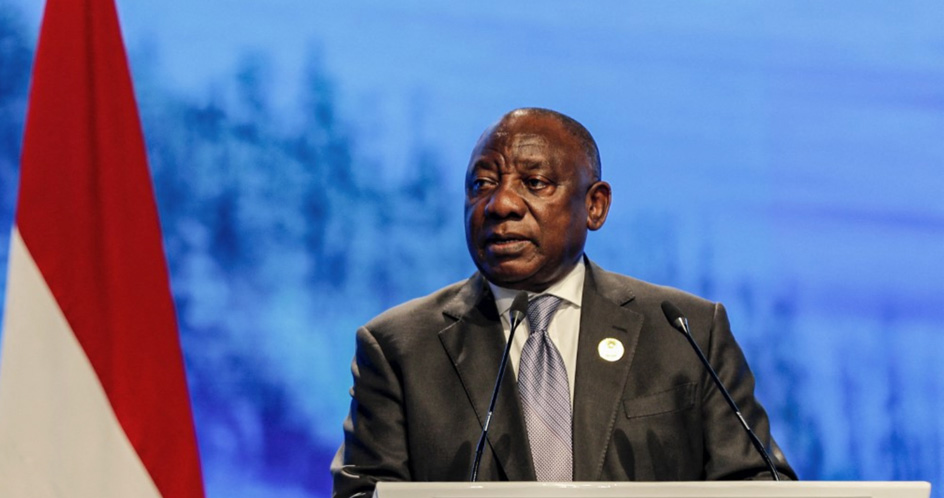African leaders have a new narrative on climate – brands operating on the continent should listen – Kwame Senou
A radical shift is occurring in African leaders’ position on climate change. PR consultant Kwame Senou examines how corporations can navigate for a better engagement with governments on this crucial issue.
“Desertification in the north, drought in the centre, pollution in the coast, are enough evidence for all to see, Nigeria is committed to net zero by 2060,” said Muhammadu Buhari, the President of the Federal Republic of Nigeria at the COP26 in November 2021 at Glasgow. A year later, on November 9, 2022, President Buhari, who governs the most populated country and, the largest economy in Africa, warned other world leaders with the following message published in the Washington Post: “Don’t tell Africa that the world cannot afford the climate cost of its hydrocarbons — and then fire up coal stations whenever Europe feels an energy pinch. Don’t tell the poorest in the world that their marginal energy use will break the carbon budget — only to sign off on new domestic permits for oil and gas exploration. It gives the impression your citizens have more of a right to energy than Africans.” This stance is a radical shift that will shape Africa’s positioning on climate issues in the years to come.
Two months before President Buhari publishing his latest view, African leaders’ change in tone came to the fore when they slammed Western absence from the Africa Adaptation Summit. At the event’s opening ceremony, President Macky Sall of Senegal, and Chairperson at African Union (AU) said: “I cannot fail to note with a touch of bitterness the absence of the leaders of the industrialised world, because these are the main polluters of our planet, and it is them who should finance adaptation.” Senegal, whose coastal cities on the Atlantic are battling with erosion and increased flooding, each year. President Félix Tshisekedi of the Democratic Republic of Congo, home to the largest tropical forest in the world and considered as the second green lung of the planet after Amazon, also had harsh words for Western leaders, with Dutch Prime Minister Mark Rutte being the only one who showed up to the summit in person.
Bread or oxygen, the impossible choice
Reading through President Buhari’s opinion piece, one can easily see that Africa is now distancing itself from the initial alignment on the West’s carbon-neutral position that was common in Glasgow a year ago. When Nigeria and South Africa promised carbon-neutral positions, most analysts were somewhat surprised.
The ‘going green’ movement in South Africa had already been progressing for years. Leading this, was the banking sector that had started the journey of sustainable investment and funding several years ago, partly due to pressures by various stakeholders including shareholder activism. This was also in effort to nudge the government to create opportunities for alternative energy solutions and some competition for Eskom, one of the biggest coal powered utilities in the world. For instance, three of South Africa’s major banking institutions which are RMB, Nedbank and Absa have given themselves less than five years to stop funding new coal-fired projects to meet the Paris Agreement goal. It is suspected that their influence was behind the pledge. There’s also the understanding that these pledges were done as incentives for the West’s fulfilment of its commitment to an adaptation fund.
The conversations among African top leaders now suggest that African governments no longer believe in the promises made by the Western nations in Copenhagen, 13 years ago. President Buhari made it clear in his opinion piece: “Many of my peers are frustrated with Western hypocrisy and its inability to take responsibility. Governments have repeatedly failed to meet their commitments to the $100 billion fund for climate adaptation and mitigation in the developing world — for the mess their industries caused.”
In the same vein, the Democratic republic of Congo (DRC) feels that it needs “Oxygen as much as bread,” as Eve Bazaïba Masudi, Deputy Prime Minister, explained to The Africa Report / Jeune Afrique. She went further to add: ‘’… there is no treaty in the world that prohibits a country from emitting CO2 for its development needs.”
Those views are largely shared in Africa as explained by President Sall, who said at the COP27, “Africa is for a green transition that is equitable and just, instead of decisions that jeopardize our development, including universal access to electricity to which 600 million Africans remain deprived.’’
African leaders want their agency
As far as 2015, at COP21, President Faure Gnassingbe of Togo clearly indicated that “we need actions, the speeches are enough!”. In 2021, when the world was just getting vaccinated and resuming travel – many were concerned about the environmental impact of this. Many scholars linked the human effect to the appearance of viruses like COVID-19. But it quickly appeared that the West wanted to use its financial might to prevent Africa from using its oil and gas reserves. The blanket ban on fossil fuel financing only changed with the Ukraine war and is still primarily domestic.
These shifts in messaging signal a new era. It is an era where African governments can no longer ignore domestic challenges. Africa is responsible for a low amount of global greenhouse gas emissions. But the effects are already visible. More than 640 million Africans have no access to energy, which means a rate of just over 40 percent, the lowest in the world. According to AfDB, per capita energy consumption in sub-Saharan Africa (excluding South Africa) is 180 kWh. Most experts agree that if it continues at its current growth rate, Africa’s population will double by 2050. That would be 2.5 billion people, which means, more than a quarter of the world’s population would be in Africa. The median age in Africa today is 18 years. It means most of the population is not productive but needs extensive government care (education, health, security, social benefits). It puts an enormous burden on African governments.
Africa’s financing gap is well known, as well as its high cost of borrowing. Most governments care for the proceeds from mineral resources to complement their funding needs to address the social demands and the infrastructures needs in their countries. They want their agency to charter their own development path in their own way. More so, climate change is already a reality for most African countries. Burundi is a good example, being the least contributor to the greenhouse gas effect in the world but where eight out of 10 people internally displaced are on the move due to climate related hazards such as floods, water deficit, landslides, and violent winds.
It is the time for industrialization
Most countries in Africa have adopted short, medium, and long-term plans to conduct their development. Influenced by the work of the African Economist Carlos Lopes, the advisory of the Tony Blair Institute, and the activism of free trade zone operators like Arise, policymakers and government leaders are now fully convinced that manufacturing and other industries are the most effective tool to create jobs needed for the African Youth. Some countries such as Benin, betting on industrialisation, have started regulating their domestic carbon markets.
But it also means there’s a new planning for energy production to power these new industries. There’s a push for green industrialization, but the power needed and the price surge in renewable energy post the conflict in Europe will drive caution from a complete green revolution.
As Africa has mastered gas-powered energy generation, it is challenging for the governments to align entirely with the renewable’s conversation. It is a new dependence they are looking to avoid whenever possible. It forces them to align their messaging with their domestic policy and the needs that are coming along.
Brands should listen and adapt their African strategy
According to Net Zero Tracker, Ghana, South Africa, and Malawi are the countries which have pledged to be net zero countries by 2070 or 2050. Seventeen other countries have proposed or started discussing a net zero pledge, and the Benin Republic has achieved its goal by 2000 (self-declared). Africa understands the need to adapt in the face of climate change. But for Africa to agree to any sustainability strategy, it must fit into the development strategy it has chosen.
Recently, MAUTO, the leading electric two-wheeler in Africa, announced the first closing of a $5 million transaction in the voluntary carbon offset market. Shegun Adjadi Bakari, CEO of MAUTO, insisted, “There are effective ways to finance the ecological transition in Africa and make it affordable and sustainable. No population will accept this (the ecological transition) without strong support. That’s the whole point of this operation“. When MAUTO approached us in early January 2022 to launch electric bikes in Benin and Togo, we advised them to ensure relevance between their strategy and the local needs. Not only did they communicate effectively to the population their ecological transition offer, but they also built it around accessibility and affordability while creating jobs by setting up local factories powered by solar energy.
Brands operating in Africa should ensure their adherence to global frameworks and ESG commitments fit with national strategies to have governments’ support on the continent. It simply means ensuring that their business models drive job creation and economic growth while protecting revenues (fiscal or non-fiscal) for the states. An African strategy considering local partners is the only way to achieve that. Also, there’s much to do with Governments, regarding the need of early-stage communication and education on climate change, environment, and the potential of the green economy. Citizens that are aware of the challenges and the trends would be more concerned servants, workers, entrepreneurs and more exigent consumers.
Meles Zenawi, former prime minister of Ethiopia and the African Union’s chief negotiator during the Copenhagen Summit talks, said this on December 16th, 2009: “But we are not here as victims nursing our wounds of the injustice of the past. Africa is a continent of the future; it is destined to be a growth pole of the 21st century. We are therefore here not as victims of the past but as stakeholders of the future, reaching out across the continents, so that together we can build a better and fairer future for all of us”. This pronunciation that was made 13 years ago, summarized the current situation well enough.
This article was first published on New African Magazine and PRCA BLOG




